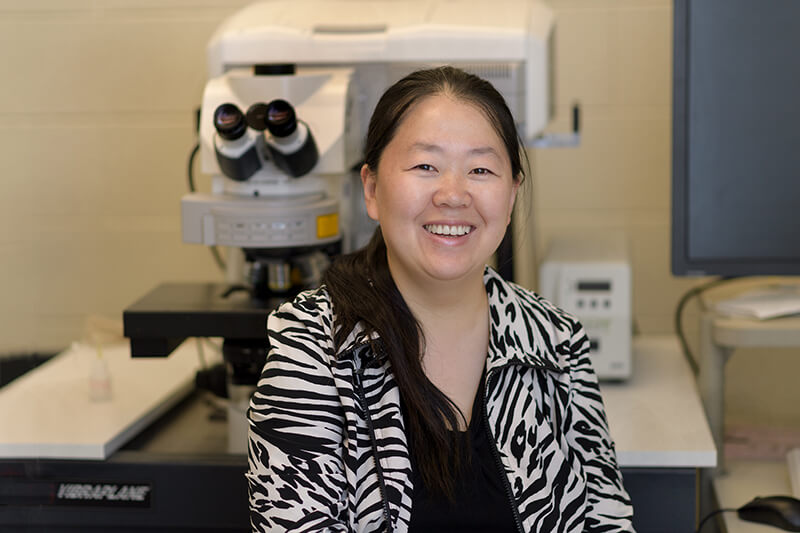May 3, 2017
Purdue Profiles: Chunhua Zhang
 Chunhua Zhang, assistant professor of botany and plant pathology. (Purdue University Photo/John Underwood)
Download image
Chunhua Zhang, assistant professor of botany and plant pathology. (Purdue University Photo/John Underwood)
Download image
Agriculture has always been an important part of Chunhua Zhang's life. As a child growing up in Northeast China, she was familiar with growing and managing different types of crops such as maize, soybean and rice. Now, as an assistant professor of botany and plant pathology, it is her goal to benefit agricultural crop production by studying the mechanisms of plant growth and development at the cellular level.
She has a bachelor's and master's degree in agronomy from the China Agricultural University and a doctorate in plant biology from Purdue.
What are you researching and why is it important?
My research is focused on understanding how proteins transport between different organelles within a plant cell, and how they are regulated during plant growth and in response to environmental conditions. We also develop small molecules that could be used to transiently manipulate the transport process so that we can better understand the underlining mechanisms. The cellular process we are studying is essential for plant growth and development and is directly linked to crop yield and quality formation. There is no doubt that agriculture is important and that was the reason I started my research career in understanding the mechanisms of cotton fiber development during my master’s degree.
We had a lot of difficulty with cotton fiber research because a lot of tools we needed were not available, such as generating transgenic plants in short time and live cell imaging with fluorescence proteins. I found it much easier to understand the basic mechanisms using model plants, Arabidopsis thaliana, during my doctoral studies at Purdue with Dr. Daniel Szymanski in the Department of Agronomy. Although my current research uses model plants as well and it is still considered basic plant biology, I believe the basic foundation is needed and is important for better agricultural production and crop improvement in the future.
What inspired you to pursue this research?
My whole career path so far is motivated by my belief that agriculture is important for China and every country in the world. I like plants and want to understand how they grow and how to make them grow better.
What is the most challenging part of your research?
All researches have challenges and mine come from the fact that protein transport between organelles is essential for plant growth and is very dynamic and undergoes continuous regulation. Studies on the dynamic process rely on a lot of live cell imaging and quantitative image analysis. However, when we remove an essential gene to study its role in protein transport, we often get a lethal plant, which makes it impossible to study. We can develop small molecules that allow us to transiently manipulate the process, but it often takes us long time to screen large chemical libraries and characterize these molecules before we can use them.
What is the most rewarding part of your research?
The excitement of new discovery is a big reward. Some of our small molecules actually not only target plant proteins, they can target homologous proteins in other organisms, such as mammals and fungi as well. It is rewarding to see plant research discoveries that can benefit human society, not only by providing basis for food security, but also have the potential to benefit human health research.
Why is Purdue's Plant Sciences initiative important for students?
The Plant Sciences initiative has brought 10 new faculty members in the research areas of plant molecular and cell biology, plant pathology and ecology to the College of Agriculture. Plant science research is essential for improving agricultural production, no matter whether a model plant system or specialized crops are used in the research. The initiative provides more opportunities for our undergraduate students to participate in research. Taking me as an example, my lab has hosted seven undergraduate students for research since I became a faculty member last year. Increased numbers of faculty also allow us to develop new curriculums that cover more topics in plant sciences, which benefit our students even more.
Writer: Megan Huckaby, 765-496-1325, mhuckaby@purdue.edu

